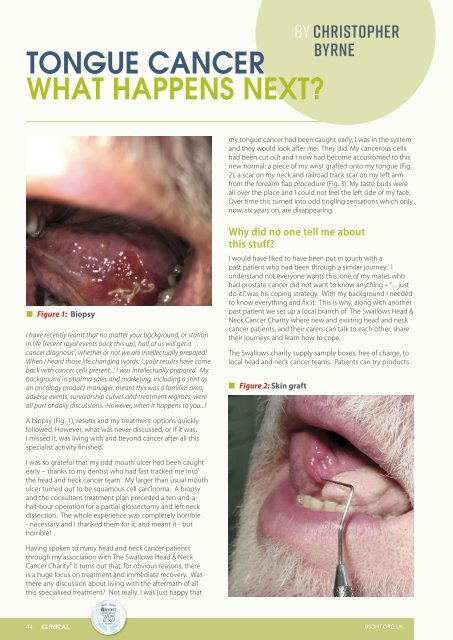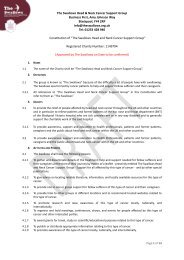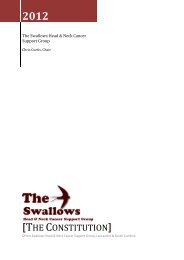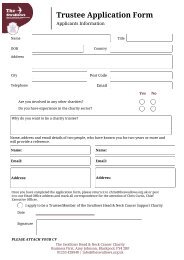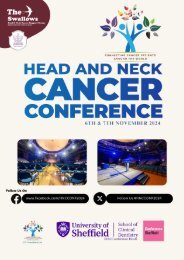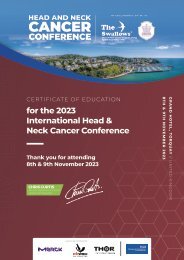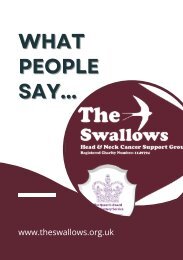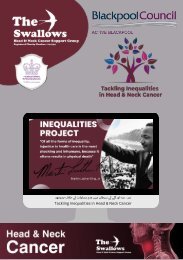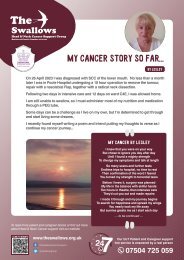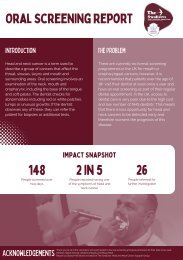Chris Byrne Article
Tongue Cancer what happens next?
Tongue Cancer what happens next?
You also want an ePaper? Increase the reach of your titles
YUMPU automatically turns print PDFs into web optimized ePapers that Google loves.
TONGUE CANCER<br />
WHAT HAPPENS NEXT?<br />
by CHRISTOPHER<br />
BYRNE<br />
my tongue cancer had been caught early, I was in the system<br />
and they would look after me. They did. My cancerous cells<br />
had been cut out and I now had become accustomed to this<br />
new normal: a piece of my wrist grafted onto my tongue (Fig.<br />
2), a scar on my neck and railroad track scar on my left arm<br />
from the forearm fl ap procedure (Fig. 3). My taste buds were<br />
all over the place and I could not feel the left side of my face.<br />
Over time this turned into odd tingling sensations which only<br />
now, six years on, are disappearing.<br />
■ Figure 1: Biopsy<br />
I have recently learnt that no matter your background, or station<br />
in life (recent royal events back this up), half of us will get a<br />
cancer diagnosis¹, whether or not we are intellectually prepared!<br />
When I heard those life changing words: ‘...your results have come<br />
back with cancer cells present...’ I was intellectually prepared. My<br />
background in pharma sales and marketing, including a stint as<br />
an oncology product manager, meant this was a familiar area;<br />
adverse events, survivorship curves and treatment regimes, were<br />
all part of daily discussions. However, when it happens to you...!<br />
Why did no one tell me about<br />
this stuff?<br />
I would have liked to have been put in touch with a<br />
past patient who had been through a similar journey. I<br />
understand not everyone wants this, one of my mates who<br />
had prostate cancer did not want to know anything – “…just<br />
do it!” was his coping strategy. With my background I needed<br />
to know everything and fi x it. This is why, along with another<br />
past patient we set up a local branch of The Swallows Head &<br />
Neck Cancer Charity where new and existing head and neck<br />
cancer patients, and their carers can talk to each other, share<br />
their journeys and learn how to cope.<br />
The Swallows charity supply sample boxes, free of charge, to<br />
local head and neck cancer teams. Patients can try products<br />
■ Figure 2: Skin graft<br />
A biopsy (Fig. 1), results and my treatment options quickly<br />
followed. However, what was never discussed, or if it was,<br />
I missed it, was living with and beyond cancer after all this<br />
specialist activity fi nished.<br />
I was so grateful that my odd mouth ulcer had been caught<br />
early – thanks to my dentist who had fast tracked me into<br />
the head and neck cancer team. My larger than usual mouth<br />
ulcer turned out to be squamous cell carcinoma. A biopsy<br />
and the consultant treatment plan preceded a ten-and-ahalf-hour<br />
operation for a partial glossectomy and left neck<br />
dissection. The whole experience was completely horrible<br />
- necessary and I thanked them for it, and meant it - but<br />
horrible!<br />
Having spoken to many head and neck cancer patients<br />
through my association with The Swallows Head & Neck<br />
Cancer Charity² it turns out that, for obvious reasons, there<br />
is a huge focus on treatment and immediate recovery. Was<br />
there any discussion about living with the aftermath of all<br />
this specialised treatment? Not really. I was just happy that<br />
44 CLINICAL BSDHT.ORG.UK
■ Figure 3: Forearm fl ap dissection<br />
to help them with such problems as dry mouth and the<br />
after effects of radiotherapy. It will come as no surprise<br />
that mental health is a real problem for some patients, as<br />
the surgery and radiotherapy can be visibly disfiguring and<br />
impact badly on speech.<br />
A main role in my work required me to give presentations so I<br />
was terrified when I heard myself talking diff erently as a result<br />
of my tongue reconstruction. I got through this, more in my<br />
head than anything, but real nonetheless, and I now give talks<br />
on the head and neck cancer patient’s journey. For those<br />
who need to talk to someone who ‘gets it', and when they<br />
want to talk, The Swallows has a 24/7 helpline³ for anyone<br />
impacted by head and neck cancer, especially for those<br />
moments when it all gets too much and they need someone<br />
to talk to who has been on this journey.<br />
Dry mouth<br />
Up to 78% of H&N patients who have had radiation therapy<br />
suff er from xerostomia. 4<br />
When a patient is telling you about their dry mouth as a result<br />
of surgery, radiotherapy or chemotherapy, it is important to<br />
remember it is the journey they have been on that has led to<br />
this discussion with you, their clinician. Be mindful when you<br />
are looking after our mouths and ask us about dry mouth.<br />
Some of us might need coaxing to open up about our issues.<br />
Patients with radiotherapy induced hyposalivation should be<br />
referred to nutritionists and dental clinicians should monitor<br />
them for mouth infections.⁵<br />
In the UK rates of head and neck cancer are on the rise. Since<br />
1990, Cancer Research UK has reported⁶ incidence rates have<br />
increased by around a third overall, with rates in women<br />
increasing by almost half again and in men by a fi fth. While<br />
head and neck cancer is the 8th most common cancer overall<br />
it is 4th most common in men. Us men are not generally that<br />
good at spotting these things, odd lumps, changes in taste,<br />
so when we do see you bear this in mind. Talk to us about<br />
smoking, drinking and the other things on the list below.<br />
A big advance in head and neck cancer prevention occurred<br />
when the UK Government recommended HPV vaccination<br />
for boys. Human papilloma virus vaccines⁷ are now available<br />
for boys as well as girls of school age with the aim of reducing<br />
this risk factor. Vaccinating boys and girls at school against<br />
HPV aims to significantly reduce the incidence of ovarian and<br />
head and neck cancers.<br />
Be vigilant<br />
Symptoms of dry mouth in head and neck cancer patients⁸<br />
include:<br />
• Constant dryness and a feeling of stickiness in the mouth<br />
• Difficulty swallowing or speaking<br />
• Sore throat and hoarseness<br />
• Increased thirst<br />
• Bad breath<br />
• Altered taste sensation<br />
• Difficulty wearing dentures<br />
• Oral infections such as thrush or yeast infections<br />
On a recent Swallows virtual support group meeting I asked<br />
attendees how they cope with a dry mouth and, the other<br />
common condition, oral mucositis, where the mouth is sore<br />
and inflamed from chemo/radiotherapy. As radiation burns<br />
its way through tissue it can damage that tissue resulting in<br />
inflammation, soreness, loss of taste and cause dry mouth<br />
symptoms like thick sticky saliva and also a lack of saliva.<br />
Teeth may have been removed, jaw lines remodelled and<br />
tongues grafted or even removed. It is no surprise that the<br />
incidence of dry mouth is common and maybe the result of a<br />
number of underlying causes.<br />
Xerostomia for head and neck patients is often permanent<br />
- try eating a dozen dry crackers with only sips of water to<br />
wash them down to get some insight into what permanent<br />
dry mouth feels like! A healthy mouth has active saliva, with<br />
a pH of between 6.7 and 7.4 and a normal production of<br />
saliva around 1-2ml/min when eating and talking, and around<br />
0.3-0.4ml/min at rest. Without an adequate saliva fl ow to wash<br />
away food particles and neutralise acids produced by bacteria<br />
DENTAL HEALTH | VOLUME 63 NO 3 OF 6 MAY 2024<br />
CLINICAL 45
patients can fi nd it challenging to chew, swallow and digest<br />
food properly which could lead to malnutrition and weight<br />
loss. Hyposalivation⁹, when stimulated salivary fl ow is less<br />
than 0.5ml/min (dry mouth), can lead to dental caries, acid<br />
erosion, oral candidiasis, halitosis and altered taste.<br />
My tastes changed: hot spicy foods gave way to more umami<br />
fl avoured foods (Indian to Chinese); red wine became dry<br />
rose - there's now always a Pinot Grigio box to hand in my<br />
fridge – small win!<br />
Sjögren's syndrome<br />
As clinicians, you are familiar with this autoimmune disease<br />
which may be linked to genetics and/or hormones, of which<br />
dry mouth is a common symptom. 10 People with Sjögren's<br />
syndrome may also have additional autoimmune conditions,<br />
such as rheumatoid arthritis or lupus. Other symptoms<br />
include dry eyes, dry skin, vaginal dryness, rashes and<br />
swelling between the jaw and ears (swollen salivary glands).<br />
Recommendations for patients to minimise the dry mouth<br />
element of Sjögren's syndrome are the same for dry mouth<br />
resulting from head and neck cancer treatments (surgery/<br />
chemotherapy and radiotherapy) 11 :<br />
• Cut down alcohol<br />
• Stop smoking<br />
• Practice good oral hygiene including brushing teeth with<br />
a fl uoride toothpaste twice a day<br />
• Avoid sugary food and drinks<br />
• Try sugar free gum or suck on ice cubes<br />
• Use lip balm if prone to cracked lips<br />
• Have a regular dental check up – at least every six months<br />
• Check your other medications, the patient information<br />
leaflet, to see if dry mouth is listed as a known side-eff ect<br />
Practical advice<br />
On a more practical note, the meeting attendees had a range<br />
of strategies, some idiosyncratic, to handle their dry mouth<br />
issues. Many have water bottles to sip from, crushed ice was<br />
often recommended by head and neck cancer teams but<br />
clearly this is not a practical long-term solution. Another<br />
patient had taken the time to create and mix his own solution<br />
based on xylitol as lack of sufficient teeth meant xylitol<br />
chewing gum was not an option. Water fl ossers were used<br />
by some as a gentler way to clean sensitive mouths, as were<br />
humidifiers. De-caffeinated tea was preferred as it appears<br />
to be less harsh. A dry mouth at night was commonly<br />
considered agreed as more bothersome.<br />
It was clear from this discussion that one size does not fi t<br />
all. Dry mouth also has a psychological component and in<br />
my opinion should be seen as a holistic problem rather than<br />
a mouth problem. For example, a common observation<br />
was, ‘I don't go out to eat anymore.' What does that do for<br />
socialisation? One lady had complained to her doctor that<br />
she suffered from pain at the fi rst bite of a meal and was<br />
offered paracetamol! In your roles as clinicians, even a small<br />
win can have huge benefits for your patients.<br />
On the Swallows virtual meeting another patient told us<br />
about First Bite Syndrome 12 (FBS). New to me, I've since<br />
‘Googled FBS' and it is a thing. For that patient, on that<br />
Wednesday night, you should have heard the relief in her<br />
voice - just hearing that these symptoms were a recognised<br />
problem and had a known medical term made all the<br />
difference. It wasn't all ‘in her head'! We helped provide that<br />
patient with the tools to go back to her GP and be taken<br />
seriously.<br />
The prevalence of FBS is about 9.6% and usually considered as<br />
a post operative complication in head and neck cancer. I also<br />
heard about prescription treatments like Pilocarpine 13 which<br />
works on muscarinic receptors to stimulate salivary gland<br />
function. There was a discussion around the side effects of<br />
Pilocarpine, some based on the known adverse events such<br />
as sweating and fl ushing and one which I have researched<br />
that had no basis on known facts – no data (so not reported<br />
here). This fl ags up a warning to all health care professionals:<br />
help educate your patients to distinguish between fact and<br />
fi ction, between useful researched products and anecdotal<br />
stories which do not stand up to scrutiny. Your role as a HCP<br />
is crucial to help patients navigate the AI and fake news world<br />
we all inhabit.<br />
Patients spend a lot of time talking about how to deal with<br />
dry mouth. There is no one size fi ts all solution. Why not<br />
just recommend water? Water is a temporary answer, it<br />
could wash away any saliva leaving the mouth vulnerable<br />
to oral disease. Dry mouth patients are not dehydrated (not<br />
withstanding other conditions) and water can of course<br />
increase the frequency of toilet visits. Sipping water can<br />
help, but is not a solution (pun intended!), gels, creams, rinses<br />
and sprays are often better suited as they are formulated<br />
specifically for dry mouth, especially where they contain<br />
matching enzymes. Your patients may not be aware what<br />
is available to help them. Oralieve 14 have a useful range of<br />
moisturising mouth sprays and mouth gels replicating the<br />
same natural enzyme system found in saliva; Xerostom 15<br />
mouth spray, the Biotene 16 range, Xylimelts17 and Dr Heff s 18<br />
Remarkable mints (containing Xylitol) are all available to<br />
name a few, so one or a combination should be able to<br />
provide some dry mouth relief for your patients.<br />
When you are seeing patients who are living with and beyond<br />
head and neck cancer please understand that the journey<br />
they have been on is often long, complicated and can have<br />
had a severe impact not only on their physical appearance<br />
but also their psychological well being. There are four<br />
questions to ask:<br />
• Does your mouth usually feel dry?<br />
• Do you regularly do things to keep your mouth moist?<br />
• Does your mouth usually become dry when you speak?<br />
• Do you get out of bed at night to drink fl uids?<br />
These four questions have been clinically validated to identify<br />
75% of all dry mouth suff ers 19 . Please use them - we need<br />
your expertise.<br />
As a head and neck cancer family of patients, we have<br />
learned to live with some frankly nasty side effects from our<br />
treatments, so as dental hygienists and therapists, when you<br />
are looking into our mouths ask us about common conditions<br />
46 CLINICAL BSDHT.ORG.UK
like dry mouth, we may need a prompt to talk about this stuff.<br />
Research the products available and talk to us about them,<br />
we will listen.<br />
Author: <strong>Chris</strong>topher <strong>Byrne</strong> B.Sc. (Hons), MBA<br />
Reluctant tongue cancer patient<br />
Contact: chris.a.byrne.cb@gmail.com<br />
References<br />
1. NHS. Over view: Cancer. www.nhs.uk/conditions/cancer<br />
2. The Swallows Head & Neck Cancer Charity: https://theswallows.org.uk.<br />
www.theswallows.org.uk/the-cancer-journey/discovery<br />
3. The Swallows Head & Neck Cancer Charity 24/7 helpline: 07504725059<br />
4. Shulz RE, Bonzanin LIL, Ortigara GB, Soldera EB, Danesi CC, Antoniazzi<br />
RP et al. Prevalence of hyposalivation and associated factors in<br />
survivors of head & neck cancer treated with radiotherapy. J Appl Oral<br />
Sci. 2021:29:e20200854. doi:10.1590/1678-7757-2020-0854<br />
5. www.oncologynurseadvisor.com/home/departments/radiation-andyour-patient/radiotherapy-salivary-glands-hypo-salivation-patientstreatments-risk.<br />
Furlow, Bryant, January 12, 2024.<br />
6. Cancer Research UK. www.cancerresearchuk.org/health-professional/<br />
cancer-statistics/statistics-by-cancer-type/head-and-neck-cancers/<br />
incidence.<br />
7. Gov.UK HPV vaccine to be given to boys in England. 2018. www.gov.<br />
uk/government/news/hpv-vaccine-to-be-given-to-boys-in-england<br />
8. Dhull AK, Atri R, Dhankhar R, Chauhan AK, Kaushal V. Major risk factors<br />
in head & neck cancer: a retrospective analysis of 12-year experiences.<br />
World J Oncol. 2018; 9(3):80-84. doi 10.14740/wjon1104w<br />
9. Humphrey SP, Williamson RT. A review of saliva: normal composition,<br />
flow and function. J Pros Dent. 2001;85(2):162-169. www.thejpd.org/<br />
article/S0022-3913(01)54032-9/fulltext<br />
10. www.nhs.uk/conditions/sjorgens-syndrome<br />
11. Macmillan Cancer Support. Causes and risk factors of head and neck<br />
cancer www.macmillan.org.uk/cancer-information-and-support/headand-neck-cancer/causes-and-risk-factors-of-head-and-neck-cancer<br />
12. www.oncolink.org.cancers/head-and-neck/side-effect-managementsupport-resources/first-bite-syndrome<br />
13. Hsu CY, Hung KC, Lin MS, Ko CH, Lin YS, Chen TH et al. The effect of<br />
pilocarpine on dental caries in patients with Sjorgens syndrome: a<br />
database prospective cohort study. Arthrit Res Ther. 2019: 21: 1-10. doi:<br />
10.11861s13075-019-2031-7<br />
14. Oralieve Dry Mouth Relief. www.oralieve-direct.co.uk<br />
15. https://xerostrom.com/en<br />
16. www.biotene.com<br />
17. https://xylimelts.co.uk<br />
18. https://drheffs.com<br />
19. Sreebny LM, Valdini A. Xerostomia. Part 1: Relationship to other oral<br />
symptoms and salivary gland hypofunction. Oral Surg Oral Med Oral<br />
Pathol. 1988;66(4):451-458.<br />
Cite this article:<br />
<strong>Byrne</strong> C. Tongue cancer. Its impact on a patient’s dry mouth. Dental<br />
Health 2024;63(3): 44-47 https://doi.org/10.59489/bsdht143<br />
ORACLE<br />
You can now prescribe Oralieve<br />
Moisturising Mouth Gel<br />
60% of older adults complain of dry mouth, which may be<br />
associated with polypharmacy. With over half of those aged<br />
65 or older taking three or more prescribed medications,<br />
dental teams will increasingly see patients suffering from<br />
this condition.<br />
Dry mouth can lead to difficulty speaking and swallowing,<br />
negatively affect oral health, resulting in tooth loss, and also<br />
impact the quality of life of sufferers.<br />
Oralieve Moisturising Mouth Gel provides effective and<br />
lasting relief for dry mouth and can now be prescribed by<br />
dental healthcare professionals.<br />
Support your patients by recommending Oralieve - the<br />
most recommended brand by healthcare professionals for<br />
dry mouth relief.<br />
For more information or patient samples, visit: www.oralieve.co.uk<br />
DENTAL HEALTH | VOLUME 63 NO 3 OF 6 MAY 2024<br />
ORACLE 47


